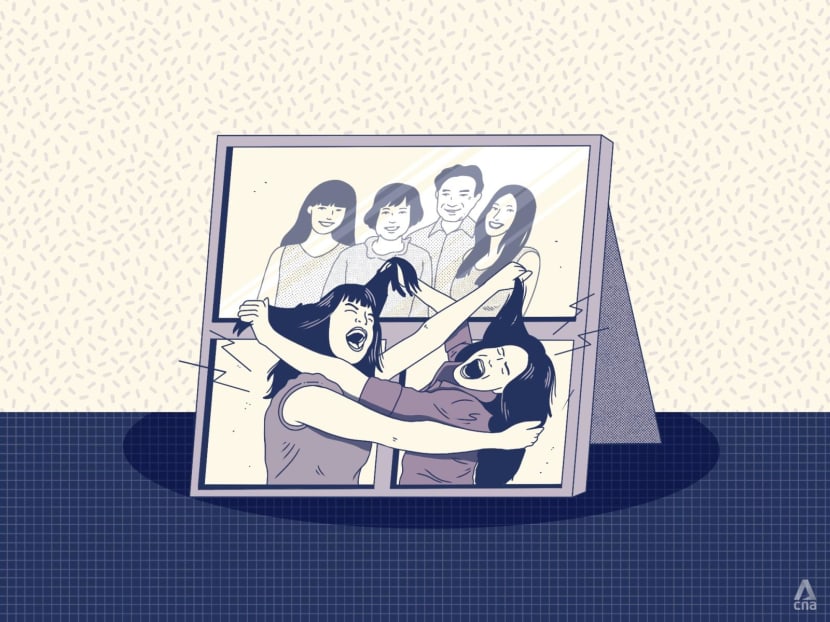'There she goes again': Is it wrong to cut ties with a sibling you've fallen out with?
Sibling relationships are uniquely complex, shaped by lifelong bonds, shared histories and societal expectations to maintain family ties, even if relationships are strained.

(Illustration: CNA/Nurjannah Suhaimi)

This audio is generated by an AI tool.
Adulthood is not just one phase of life but comes in stages. Its many facets, from managing finances and buying a home to achieving work-life balance and maintaining healthy relationships, can be overwhelming. In this series, CNA TODAY's journalists help readers deal with the many challenges of being an adult and learn something themselves in the process.
I was tucking into a piping hot bowl of kimchi stew with my friend when she suddenly blurted out: "There she goes again. Why can't she act like a proper sister?"
My friend was checking her phone with furrowed brows, signalling that something must have been said in her family chat group that infuriated her. I asked my friend what her sister had done, unaware of their history.
She went on about how her younger sister – her only sibling – can say hurtful things or act without caring about others. And it has been this way since they were growing up. My friend is now in her early 30s, while her sister is 28.
Without elaborating on the details of the latest source of frustration, my friend said that it wasn't the worst thing her sister had ever done. But after years of putting up with her behaviour and expecting her sister to do better, only to keep getting disappointed, she was at her wits' end.
My friend also couldn’t understand how her sister could behave in ways she could never imagine doing herself, especially since they share the same DNA.
She was exasperated enough to consider distancing herself from her sister, but found it difficult to do so because of guilt. As the older child, she felt that it was her duty to care for her sibling, no matter how poorly her sister treated others.
"That can't be healthy," I thought to myself. I tried to empathise but couldn’t shake the feeling that there was more to unpack.
Sibling friction is uniquely challenging. Unlike with romantic partners or friends, cutting ties isn’t as simple. But is it possible or necessary, especially when one's mental health is affected? How does one cope with the guilt?
To understand this better, I sought insights from therapists and a counsellor.
COMMON REASONS BEHIND SIBLING FRICTION
Ms Gayatri Singh, a senior therapist at Incontact Counselling & Training, told me that although children may grow up in the same household with the same parents, each child’s experience is unique, and factors such as birth order can play a role.
For instance, the oldest or first-born child might receive preferential treatment, which can shape dynamics within the family, she said.
Regarding my friend's situation, Ms Singh said that oldest children tend to feel a strong sense of responsibility and compliance within the family, since they often receive automatic approval from their parents, which their siblings may not experience.
The experts also said that sibling conflicts are common during the growing-up years, but relationships often improve as individuals transition into adulthood.
It becomes a problem when tensions escalate to physical or verbal abuse, significantly affecting one's well-being.
Family therapist Lilian Loo said that past issues such as childhood rivalries, parental favouritism or unresolved conflicts can linger and cause distance between siblings in adulthood.
"Some siblings compare and compete with each other about personal success, attention, love and validation from their parents due to inadequacy and insecurity issues leading to sibling rivalry."
Ms Loo, who works at Promises Healthcare, said that preferential treatment from parents can cause deep emotional wounds and create a sense of jealousy and resentment over the years.
"Parents may also expect the older sibling to give in to the younger sibling and expect children to be cordial regardless," she said, adding that adult siblings who feel less favoured may carry this sense of injustice into adulthood.
Unresolved conflicts are also part of the cause. Ms Loo said, for instance, that disputes over finances and care for ageing parents that are not addressed can fester over time, creating resentment and hostility.
Other factors that the experts said may engender sibling discord also include:
- Personality
This is where one has a stronger personality than others who are more compliant. This can be aggravated if one sibling shows manipulative behaviour, and a less assertive sibling may silently endure it - Traumatic events
Abuse or violence between siblings can inflict deep psychological and emotional wounds. In response to the pain and lack of safety, affected siblings may distance themselves - Major life events such as marriage and parenthood
These can be stressful for both parents and children, with some children projecting their frustrations onto siblings due to an inability to express their emotions
HOW TO NAVIGATE STRAINED RELATIONS
I asked what siblings should do if they struggle with handling a difficult relationship with their brothers and sisters.
Ms Singh of Incontact Counselling & Training said that, for starters, it is best to avoid confronting a sibling in front of the family, because heightened emotions could escalate matters and lead to defensiveness.
"Instead, find an opportunity for a one-on-one conversation, such as taking a walk or engaging in an activity where both parties feel at ease.
"Sometimes, it's helpful to reflect on your sibling’s perspective, such as how they grew up and how they might feel within the family. Approaching them with curiosity, if possible, can make a difference. However, I understand that this isn’t always easy."
Ms Sophia Goh, principal counsellor at Sofia Wellness Clinic, said that using "I" statements to express your feelings can be more effective than placing blame or criticising.
For example, it's better to say "I feel disrespected" than to say "You are rude".
One method to guide such conversations is the non-violent communication framework, Ms Goh added. This is a communication method created by American psychologist Marshall Rosenberg, which emphasises clarity and ends with a specific request.
She gave an example of a sibling borrowing a shirt without permission and then returning it with a stain, leaving the brother or sister feeling upset.
"This (feeling) comes from the need to have your belongings treated with care. To verbalise this, you can say, 'I would appreciate it if you could ask me before borrowing my clothes and take better care of them'," Ms Goh said.
Expressing it this way encourages mutual understanding and respect.
However, if the conversation goes downhill, particularly with a sibling who is emotionally reactive or dismissive, Ms Singh said that the parties may not be ready to engage constructively and if that happens, there is no harm in taking a time-out.
If the sibling continues to be disrespectful, she recommended setting firm boundaries such as saying, “I don’t want to be spoken to like this”.
"Ultimately, relationships require effort from both sides. If a sibling is unwilling to engage respectfully, you may need to disengage for your well-being."
Ms Goh of Sofia Wellness Clinic said that distancing oneself from a sibling can affect the entire family dynamic, and strategies to manage conflict and set boundaries may not always be enough in these complex situations.
"I recommend additional strategies, such as minimising direct contact with the sibling while still attending family events, and maintaining a neutral stance.
"For example, consider holding family gatherings at public or neutral locations instead of having one family member host, which could already be a source of conflict or tension."
RECOGNISING THAT SIBLINGS ARE DIFFERENT PEOPLE
For strained relationships, Ms Singh stressed that reconciliation is possible only when both parties are willing to build trust.
She explained that unlike friendships or romantic relationships, sibling bonds are deeply rooted in shared history and a sense of familial obligation. Therefore, even when the relationship is challenging, the emotional connection and the longstanding history make it more complex to simply walk away.
"In contrast, friends and romantic partners are chosen relationships. This selection process allows us to find people with whom we connect easily and who don’t come with the same emotional baggage."
Societal expectations further complicate the issue. Ms Singh explained that within families, siblings are often expected to be lifelong supporters of one another, with an emphasis on preserving family ties.
"The decision becomes even harder when caregiving duties are involved and siblings have to work together to take care of their parents."
Ms Loo of Promises Healthcare, which provides psychiatric and psychological services, said that ultimately, if repeated patterns or toxic behaviour persist despite reconciliation efforts, it may be necessary to distance yourself to ensure your emotional health.
"Before deciding to distance yourself, it's important to reflect on whether you're acting too quickly," she added. "Is this something you tend to do often in other areas of your life? Has distancing yourself become your go-to coping mechanism instead of confronting the issue?"
If, indeed, the decision must be made, Ms Loo recommended informing your sibling that, despite efforts to resolve the issues, taking a break is necessary to allow both parties to reflect on the situation.
Distancing yourself or cutting ties with a sibling may leave you with some regret, but Ms Singh said that doing so doesn't make you a bad person.
"We often forget that we can't parent our siblings. Everyone is an adult. While we can offer care, we can't control their actions. They must take responsibility, too, and do their part.
"At the end of the day, we all have the right to choose who we allow into our lives."
















